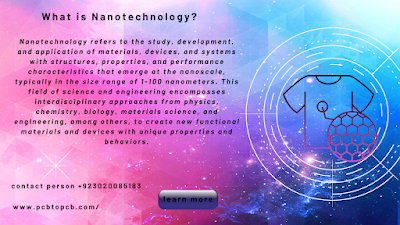What is Nanotechnology with explanation?
Nanotechnology
is a field of science and engineering focused on the control, manipulation and study of materials at the nanoscale. Nanotechnology is the application of nanoscale science and engineering to design, create and use structures, devices, and systems that have novel properties and functions because of their small size.
 |
Nanotechnology with explanation |
At the nanoscale, matter exhibits different properties than it does at the macroscale, leading to the potential for new technologies and materials with unique applications. For example, nanoparticles have a larger surface area to volume ratio compared to bulk materials, leading to improved catalytic and chemical reactions. Nanostructured materials also often exhibit enhanced mechanical, electrical and optical properties.
The field of nanotechnology encompasses a wide range of disciplines, including physics, chemistry, materials science, biology, and engineering. It involves the use of various tools and techniques for the synthesis and characterization of nanoscale materials and systems, such as electron microscopy, X-ray diffraction, and atomic force microscopy.
Nanotechnology has applications in a wide range of areas, including electronics, energy, medicine, and environmental protection. For example, in electronics, the miniaturization of components enabled by nanotechnology has allowed for the development of smaller and faster computing devices. In medicine, nanotechnology has been used to develop targeted drug delivery systems, diagnostic tools, and imaging agents. In energy, nanotechnology has been used to improve solar cells, batteries, and fuel cells.
Despite its many potential benefits, there are also concerns associated with the use of nanotechnology, particularly in the areas of health and safety. There is a need for continued research to better understand the potential risks and benefits of nanotechnology, and to develop appropriate regulations and guidelines to ensure its responsible development and use.
In conclusion, nanotechnology is a rapidly growing field with significant potential to impact a wide range of areas, from electronics and energy to medicine and environmental protection. Its success will depend on a continued focus on scientific and technological advancements, as well as responsible development and use of nanotechnology to ensure the benefits of this powerful technology are realized while minimizing any potential risks.



0 Comments